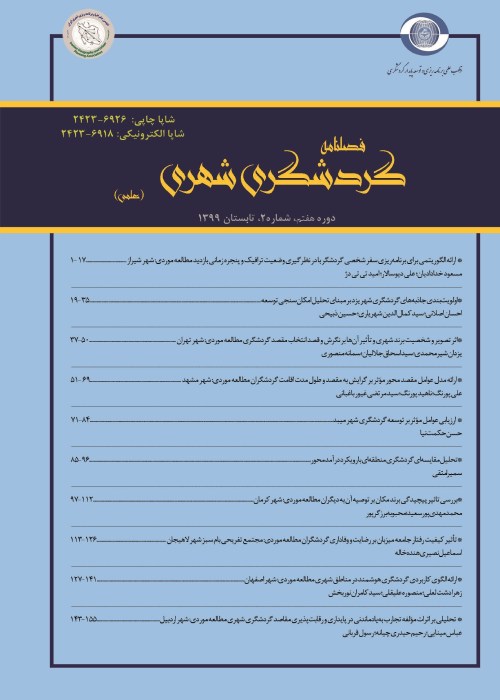Investigating the effect of social responsibility on destinations on emotional and behavioral responses of urban tourists Case study: Tehran
Along with the positive economic effects, tourism development in destinations has also brought negative environmental consequences. In accordance with this challenge, many managers of tourist destinations have focused on managing the behavior of tourists. Based on this, considering the need to deal with the mentioned challenges, or at least reduce the adverse effects and continue to attract tourists, social responsibility measures are known as one of the most effective solutions for tourism management organizations. In this research, an attempt was made to examine the effect of social responsibility of destinations on the emotional and behavioral responses of urban tourists in Tehran. The present study is applied in terms of purpose and descriptive-analytical in terms of method. The statistical population of this research was tourists entering Tehran. In order to determine the sample size, according to the number of observable variables, the sample size was estimated to be 384 people. The validity of the research tool was calculated using the confirmatory factor analysis model and its reliability was calculated using Cronbach's alpha. Data analysis was done using SPSS and SMART PLS software with descriptive statistics and structural equation modeling. The findings showed that the social responsibility of destinations had a positive and significant effect on the emotional and behavioral responses of urban tourists (satisfaction, trust, loyalty). Also, the findings indicated a positive and significant effect of satisfaction and trust on tourists' loyalty. Among the researched variables, social responsibility with a path coefficient value of 0.584 had the greatest effect on the trust variable, so that the social responsibility variable was able to explain 34% of the variance of the trust variable.Extended AbstractIntroductionSustainable development of tourist destinations such as Tehran is partly due to engaging in socially responsible behaviors by destination-related organizations and attracting the support of visiting tourists to act in environmentally responsible ways. In the past decades, the metropolis of Tehran has undergone many social and environmental changes due to population growth and development, which can affect tourism development. With the increase of environmental and social problems in Tehran, the development of the tourism industry of this destination requires serious attention to solutions such as adopting social responsibility in all pillars of its development, especially the development of the tourism sector. Such an approach can improve the reputation and image of this destination while increasing the satisfaction and trust of tourists and, as a result, their loyalty. In proportion to this necessity, in the present study, the research's central question is: What is social responsibility's effect on the emotional and behavioral responses of urban tourists in Tehran?MethodologyThe present study is applied in terms of purpose and descriptive-analytical in terms of method. A questionnaire was used to collect information. The questionnaire questions were designed using five Likert options from strongly agree to disagree. The statistical population of this study was incoming tourists to the city of Tehran, considering that in this study, the method of structural equations has been done using pls software. One of the well-known rules for determining the minimum sample required in the PLS method is provided by Barclay et al. (1995). 5 to 10 samples are required for each observable variable. A sample floor of 300 samples is also recommended. Considering that in this study, the number of observable variables (questionnaire items) was equal to 32 questions, the sample size was estimated to be 320 people. To increase confidence, the sample size was 384 people. In this research, in order to achieve the goals, structural equation modeling in SMART PLS software has been used. Results and discussionThe findings of this study indicated the effect of social responsibility of tourism destinations on the satisfaction of the results; it indicates that the value of the obtained T statistic is equal to 10.418, so this value is more significant than 1.96 and can be stated that the social responsibility of tourism destinations has a significant effect on tourists' satisfaction. Also, the coefficient of the obtained route is equal to (β = 0.513); since the coefficient of the obtained route is positive, this relationship is direct. The effect of social responsibility of tourism destinations on trust The results indicate that the value of the T statistic obtained is equal to 11.748, so this value is more significant than 1.96, and it can be said that the social responsibility of tourist destinations has a significant effect on tourists' trust. The obtained path coefficient is equal to (β = 0.584). Regarding the effect of social responsibility of tourism destinations on loyalty, the results show that the value of the T-statistic obtained is equal to 10.067, so this value is more significant than 1.96, and it can be said that the social responsibility of tourism destinations on tourist loyalty It also has a significant effect. The coefficient of the obtained path is equal to (β = 0.217). Since the coefficient of the obtained path is positive, this relationship is direct. Satisfaction and trust of tourists have a positive and significant effect on their loyalty because the value of the t-statistic obtained for the effect of satisfaction on loyalty is equal to 4.152 and for the effect of trust on loyalty is equal to 15.338; the obtained values are more than 96 / 1 is. The value of the path coefficient obtained for the effect of the satisfaction variable on loyalty is equal to 0.478, and the value of the path coefficient obtained for trust on loyalty is equal to 0.792.ConclusionThe present study presents a conceptual model of the effect of tourism destination responsibility on tourists 'emotional and behavioral responses and answers the question of how destination social responsibility affects tourists' behavioral and emotional responses. Based on this, the findings of the research hypothesis test also showed that the destinations' social responsibility positively affected the satisfaction of tourists from Tehran. Contrary to the practice of all internal studies, the concept of social responsibility of the destination is less considered and more focused on the concept of corporate social responsibility in the field of tourism, and the effects of this concept are examined only from the perspective of companies and organizations involved in service delivery. This study evaluated the effects of destination social responsibility from the perspective of urban tourists. Also, based on the findings of the first hypothesis of the research, it can be said that managers of tourism destinations can manage the consequences by strengthening the social responsibility of the destination while influencing the behavioral and emotional responses of incoming tourists. The results of testing the second hypothesis of social responsibility of destinations had a positive and significant effect on the trust of incoming tourists. In fact, when a tourist has a strong sense of trust, in turn, he will have more intention to visit the destination. This finding not only emphasizes the importance of the concept of destination social responsibility as a variable affecting destination trust as a critical variable and expands the focus on trust in the tourism industry but also explains the mechanisms of social responsibility impact on tourist trust. Testing the third hypothesis of the study showed that the social responsibility of the destinations had a positive and significant effect on the loyalty of incoming tourists. Accordingly, urban tourism destination management organizations should increase investment in destination social responsibility and integrate this with long-term strategic planning because tourists' understanding of destination social responsibility is an essential source of improving tourist loyalty. The results of testing the fourth hypothesis of the study showed that tourist satisfaction had a positive and significant effect on the loyalty of incoming tourists. Based on this, it can be argued that tourist satisfaction resulting from the social responsibility of the destination can have a positive effect on increasing the number of tourists visiting or intending to visit, resulting in destination tourists becoming loyal visitors.
Social Responsibility , Goals , Satisfaction , trust , Loyalty , Urban Tourism , Tehran
- حق عضویت دریافتی صرف حمایت از نشریات عضو و نگهداری، تکمیل و توسعه مگیران میشود.
- پرداخت حق اشتراک و دانلود مقالات اجازه بازنشر آن در سایر رسانههای چاپی و دیجیتال را به کاربر نمیدهد.




